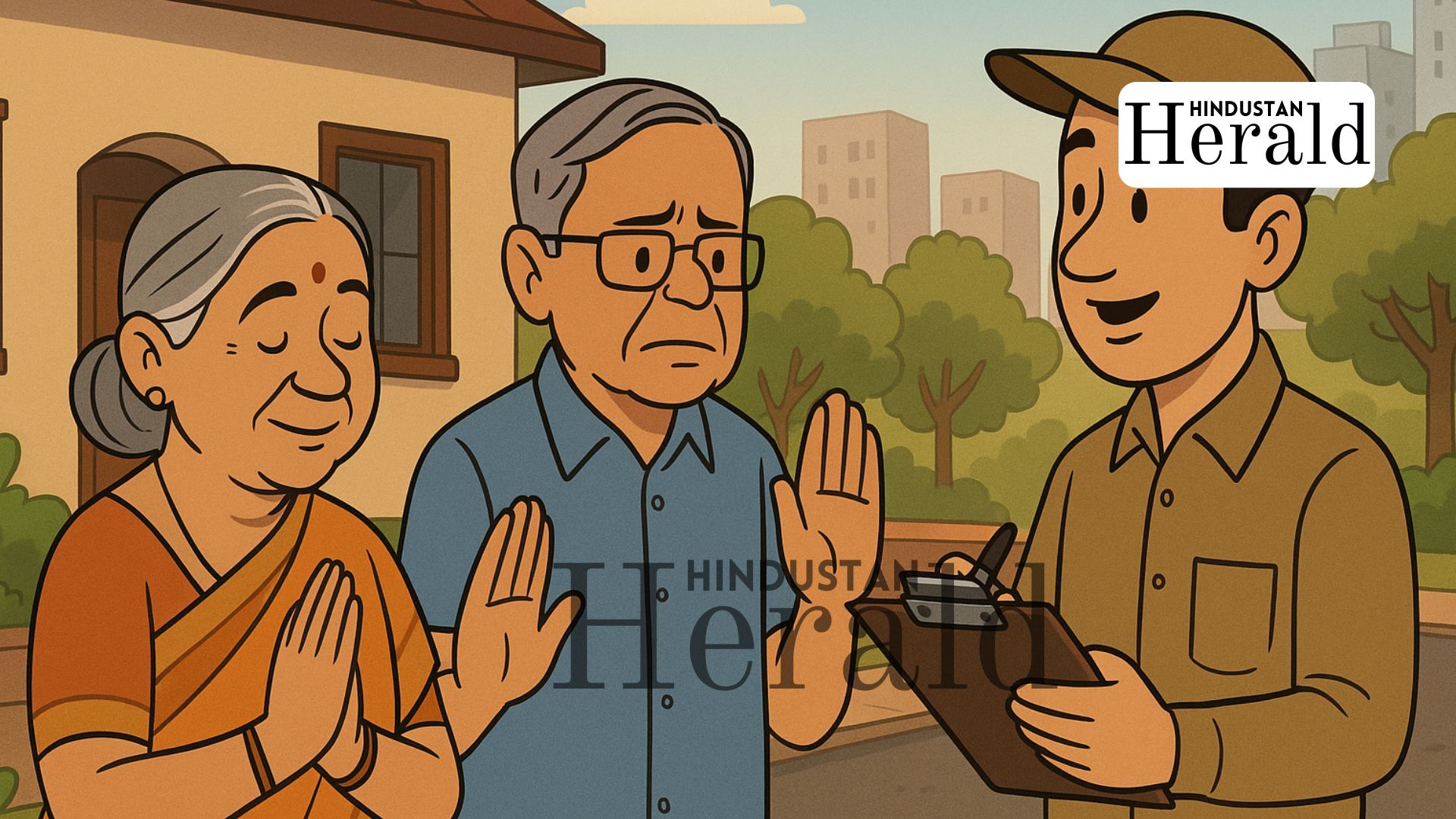Bengaluru, October 16: When the survey team arrived at the Murthy home in Jayanagar this week, clipboard in hand, they were met with politeness and a refusal. Sudha Murthy, writer, philanthropist, and Rajya Sabha member, and her husband N. R. Narayana Murthy, the Infosys co-founder who helped shape India’s IT story, said they would not take part in Karnataka’s social and educational (caste) survey.
Their reasoning was brief, handwritten, and final: “We do not belong to any backward community.” That one sentence has sparked a larger conversation than anyone expected.
A Quiet No, Loud Ripples
Officials who spoke off record said enumerators had approached the Murthys earlier this week as part of the ongoing door-to-door exercise. The couple didn’t argue, didn’t protest they simply filled out a form declining to participate.
In the note, they explained that the survey was designed to capture data on social or educational backwardness, something they said didn’t apply to them. For a family that has long lived in the public eye and built much of its reputation around merit, education, and philanthropy the refusal wasn’t confrontational. It was matter-of-fact.
Still, in a state where caste data feeds both welfare schemes and political equations, such decisions are rarely seen as neutral.
Deputy Chief Minister D. K. Shivakumar tried to play it down. “Participation is voluntary. We don’t force anyone,” he told reporters. The High Court has said much the same that no citizen can be compelled to share personal or caste information.
So, legally, the Murthys are on solid ground. But symbolically, their refusal has landed right in the middle of Karnataka’s old caste debate.
What Their Refusal Says and Doesn’t
There’s something unmistakably personal about the way the Murthys handled this. They didn’t issue a statement or post anything online. No interviews, no political framing. Just a private decision that became public because of who they are.
To some, it reads as an act of principle, a quiet insistence on privacy in an era of endless data collection. To others, it feels likea privilege to speak of the ease with which the powerful can opt out of a system designed to measure inequity.
“Refusing a caste survey when you’ve already achieved so much is one thing,” a sociologist at Bangalore University said. “But for millions who still rely on such data to claim their rights, participation isn’t optional. It’s survival.”
That tension between autonomy and obligation, between personal choice and public consequence, is what gives this episode its weight.
The Survey at the Centre of It All
The state’s social and educational survey, launched on September 22, aims to gather up-to-date caste and income data after a decade of gaps and disputes. Officials have been trudging through city apartments, rural homes, and slum settlements alike, collecting details about family structures, literacy levels, employment, and property.
The exercise is expected to cost around ₹420 crore, and completion dates have already been pushed back twice from October 7 to October 18, and possibly later for Bengaluru.
It’s a politically sensitive project. The Congress government, led by Siddaramaiah, says it’s necessary for fair policymaking. Opposition leaders accuse the state of weaponizing caste numbers before the next election.
Among the state’s dominant groups Lingayats and Vokkaligas there’s apprehension that their share in welfare programs might shrink if data tilts the balance toward smaller but more disadvantaged communities.
Against this backdrop, when one of India’s most admired families says “no” to the survey, it naturally draws notice.
Voices Around the Decision
D. K. Shivakumar repeated that “no citizen can be forced,” calling the Murthys’ stance their “personal right.” That line is meant to cool things down.
But others have been more pointed. Former Infosys director T. V. Mohandas Pai said the entire exercise distracts from real priorities. “Instead of jobs and growth, ministers are wasting time on caste arithmetic,” he remarked earlier today.
Among civil society groups, the reaction is split. Social activists say the Murthys’ move risks normalizing elite withdrawal from public data exercises. But a section of privacy advocates defend them, saying consent is non-negotiable especially when the state wants to map citizens’ social identities.
As one Bengaluru-based policy researcher put it, “You can’t preach empowerment and then question people for saying no. Refusal is also a democratic act.”
What This Moment Reflects
At its heart, this isn’t just about one couple opting out of a form. It’s about how modern India sees data, dignity, and identity.
For decades, Sudha and Narayana Murthy have stood for a certain middle-class ethic of self-reliance, education, and quiet philanthropy. They’re not political operators. But even apolitical acts can take on meaning when caste and power are in the same sentence.
Caste is the one identity that resists erasure. You can transcend it economically, but it follows socially, in how others see you and how policies are made. The Murthys’ statement, however pragmati,c brushes up against that uncomfortable truth. Their choice reminds us that progress in India still happens in conversation with caste, not outside it.
What Happens Next
The survey will move on without the Murthys’ data. The state says a handful of refusals won’t skew results. Statistically, they’re right. But symbolically, this story will linger.
Because when people of immense stature decline to be categorized, they reveal both the privilege and the paradox of belonging in modern India a nation still counting its citizens to understand who gets left behind. As one senior bureaucrat said quietly, “We’re not upset. But it tells us something even data has its limits.”
Stay ahead with Hindustan Herald — bringing you trusted news, sharp analysis, and stories that matter across Politics, Business, Technology, Sports, Entertainment, Lifestyle, and more.
Connect with us on Facebook, Instagram, X (Twitter), LinkedIn, YouTube, and join our Telegram community @hindustanherald for real-time updates.
Covers Indian politics, governance, and policy developments with over a decade of experience in political reporting.






